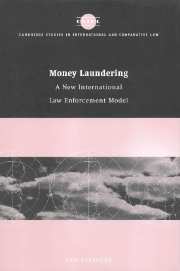Book contents
- Frontmatter
- Contents
- Preface
- Table of treaties and agreements
- List of abbreviations
- Part I New instruments in the fight against acquisitive crime: confiscation of proceeds from crime and criminalisation of money laundering
- Part II The prevention of money laundering
- 4 The application field of legislation on the prevention of money laundering
- 5 The role of financial institutions in the prevention of money laundering
- 6 The role of financial intelligence units in combating money laundering
- 7 The role of the supervisory authorities in combating money laundering
- Part III Jurisdiction over money laundering
- Part IV International co-operation in combating money laundering
- Epilogue
- Bibliography
- Index
- CAMBRIDGE STUDIES IN INTERNATIONAL AND COMPARATIVE LAW
6 - The role of financial intelligence units in combating money laundering
Published online by Cambridge University Press: 16 October 2009
- Frontmatter
- Contents
- Preface
- Table of treaties and agreements
- List of abbreviations
- Part I New instruments in the fight against acquisitive crime: confiscation of proceeds from crime and criminalisation of money laundering
- Part II The prevention of money laundering
- 4 The application field of legislation on the prevention of money laundering
- 5 The role of financial institutions in the prevention of money laundering
- 6 The role of financial intelligence units in combating money laundering
- 7 The role of the supervisory authorities in combating money laundering
- Part III Jurisdiction over money laundering
- Part IV International co-operation in combating money laundering
- Epilogue
- Bibliography
- Index
- CAMBRIDGE STUDIES IN INTERNATIONAL AND COMPARATIVE LAW
Summary
In most jurisdictions, financial institutions report their suspicions to financial intelligence units (FIUs). The status and role of FIUs in combating money laundering will be discussed hereinafter, especially the duty of secrecy and the specialty principle to which the information they process is subject.
The creation of financial intelligence units
Combating money laundering requires the expertise of specialised law enforcement agencies. The setting up of specialised financial intelligence units designed to receive and process financial information from financial institutions (and possibly other institutions) should be seen against the background of the larger phenomenon of an increasing proliferation of specialised law enforcement agencies.
Most international instruments are silent on the nature and the role of FIUs. Only recommendation 1 of the Caribbean Drug Money Laundering Conference asks that there be competent authorities which specialise in money laundering investigations and prosecutions and related forfeiture actions. The FATF recommendations refer only to the ‘competent authorities’ to which financial institutions should make their reports. The European Money Laundering Directive likewise refers to ‘authorities responsible for combating money laundering’ and limits itself to obliging the Member States to make sure that these authorities are able to request information from the financial institutions (Article 6). The silence of the Directive on this point is attributable to the lack of competence of the European Community in criminal matters. It follows that no international harmonisation has taken place with respect to the nature of these authorities, their functioning, the conditions in which suspicious transactions can be suspended and the procedures to be applied for the processing and transmittal of information received from financial institutions.
- Type
- Chapter
- Information
- Money LaunderingA New International Law Enforcement Model, pp. 183 - 199Publisher: Cambridge University PressPrint publication year: 2000
- 1
- Cited by



